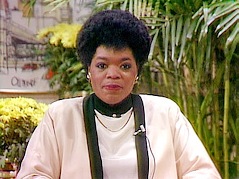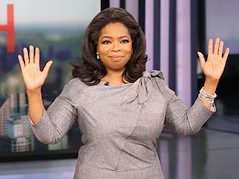Nov 2009
Oprah way back when -- in a starkly candid 1986 interview
23/11/09 15:51


Note to readers: Oprah Winfrey's decision to quit her daytime show -- but not until Sept. 9, 2011 -- became one of the year's biggest TV stories late last week. Back in 1986, though, she was still a neophyte hoping to stay in play for at least a few years. This very different look at Oprah is from an interview in Dallas just a month before her syndicated debut. It originally was published on Aug. 11, 1986.
By ED BARK
The official Oprah Winfrey biography says she "has come to offer viewers something they don't see very often on national television: a genuine person."
There are two litmus tests here. Will a star willingly give her birthdate? Will a star willingly pose for pictures?
The birthdate is Jan. 29, 1954. It says so in her bio.
The photos are in her press kit, so let's keep it that way, huh? Oprah explains why someone who has "little if any regard for pretension" (bio-speak) has decided to disallow any picture-taking during interviews.
It only took one bad experience, she says: "You couldn't tell if I was really mongoloid or if I had just been let out from the mental institution. Because I am so expressive, I end up with all these pictures where I really look deformed. And the pictures where you look the most deformed are the ones that have their own life."
Oprah has said no to a lot of picture-taking lately. Dallas is the 11th stop on a 13-city promotional tour for The Oprah Winfrey Show, which WFAA-TV (Channel 8) will carry weekdays at 3 p.m., beginning Sept. 8. In Philadelphia, she waded through 17 interviews in one day. In Dallas it's a lighter load. One, two, three, four interviews, promos customized for Channel 8, an appearance on the station's Ed Busch TV Talk Show and a reception thereafter.
"I mean, really, it's ego overload," she says. "I'm throughly sick of me at this point."
Everyone seems to know all about Oprah Winfrey. Her talk show hasn't even been seen outside of Chicago yet, but most are aware that she obliterated Phil Donahue in the ratings and send him packing to New York.
She has made one movie, The Color Purple, and received an Oscar nomination for her portrayal of Sofia. In October, she'll be featured in Native Son, the theatrical film adaptation of Richard Wright's classic novel.
She has talked and talked, to a number of major national publications, about her weight, her troubled youth and her quest to find "Mr. Right." King World, which is syndicating her talk show to the rest of the country, devised a promo that says she's witty, charming, funny, etc. Oprah told them to pull it.
"You know what makes me nervous? The pressure," she says. "I don't want people being told I'm funny and charming and witty. What that does is it automatically makes people feel just the opposite."
Oprah is holding forth in a state of recline in a Channel 8 conference room. "Do you mind if I put my feet up?" she asks, pledging to psyche herself to do a "fresh" interview.
Between interviews she breaks loudly into a chorus of "What I Did For Love," never mind the money. Her answers -- sometimes to questions she poses herself -- are interesting, animated and occasionally almost straight from her press kit's "Q&A with Oprah Winfrey Index," not to be confused with "The Oprah Winfrey Show Story Tip Sheet."
"I have never talked more about myself than I have in the last 10 days, because I don't take myself that seriously, you know. This has been like therapy for me," she says.
She has been in television for 13 years, beginning at WTVF-TV in Nashville as a reporter/anchor. In 1976 she moved to WJZ-TV in Baltimore, where she eventually got the opportunity to host the station's People Are Talking program. Oprah arrived in Chicago, at WLS-TV, in January 1984. Her assignment was to revive the AM Chicago program, which was trudging along in the ratings opposite Donahue. It took her only a few months to put Donahue on the run, get an extra half-hour of air time and have AM Chicago renamed in her honor. Thanks, Phil.
"One of the reasons I have so much respect for Donahue," she says, "is that he has already proven that women are more interested in issues and concerned about things that affect their lives than they are about how to make a perfect stuffed cabbage, or the latest ways to apply mascara."
In September, Oprah goes national, in 130 television markets covering 90 percent of the country. On Channel 8 she was scheduled to be the lead-in program to Donahue, until viewer objections to the heavy sexual content of recent programs caused the station to shift Donahue from 4 p.m. to 9 a.m. weekdays.
"I'm getting all this Donahue hype stuff," Oprah says, noting that she'll be on opposite him in only one-third of the cities carrying her syndicated show. "To be honest with you, I wish that I was competing against him. I feel more comfortable being on at 9 in the morning. I don't feel as comfortable being on in the afternoon. I've beaten him in Chicago, and people are no different in Houston, Dallas, Sacramento, Birmingham. I was told not to go to Chicago because I'd be picketed, bombed and blown out of the city, 'cause it's the most racist place in the country. Now people in Cicero (a Chicago suburb) say, 'You can't move to my neighborhood, but I love you, Ofrey.' "
This observation begs a question, but Oprah already had asked it of herself.
"I like this one -- 'What's this mean for black women?' I'm gonna have to mull that one over." she says. "What does it mean? Somebody asked me in Philadelphia. I say, 'What do you think it means? Do you think it means anything?' "
It means, she is told, that she'll be a black talk show host as long as her ratings are high. Oprah laughs, but is serious later when asked about her decision to act in two movies that very much concern the black experience in America.
"It's coincidental," she says. "I intend to do other roles that have nothing to do with being black. But I think it's important to do work that is representative of good black literature. If you're going to do a black role, you might as well do a classic black novel, as opposed to playing a pimp or a prostitute. But I don't intend to do all black roles. I would like to do something for comedic relief or something sexy. I wouldn't mind being a whore with a red dress on for a couple of scenes, just because I don't want to be stereotyped as only doing profound black pieces."
Her talk show, she says, is a reward for years of covering "a cockatoo's birthday party or a wasp's nest at a woman's house" during her stints at the Nashville and Baltimore stations.
"I covered stories that were mindless -- mindless -- and had no business being on television," she says.
Some aren't persuaded that The Oprah Winfrey Show is really any different. Her press materials include an article quoting a Chicago TV critic, who said, "Oprah has taken the Donahue formula -- gabbing to celebrities and people with various diseases and psychological maladies -- and lightened it up. She may be an inch deep, but she's irresistible."
Oprah says of the observation, "It's not a compliment. It's a curt snipe."
"We're far more emotional, and we don't take ourselves as seriously, I don't think, as Donahue," she adds. "But I'm not interested in sensationalizing or exploiting or creating something that's not there. So that's what my show is. It will live or die based on its own honesty."
Those who can't handle the heat of certain topics are warned to either change the channel or shut up.
"If I'm doing sex," Oprah says, "I can always say to people, 'If you don't want to hear about it, you all turn the channel and join us tomorrow. Please turn now and don't write me later and tell me I'm a sleaze.' And then I say, 'They're gone now. We can talk.' "
